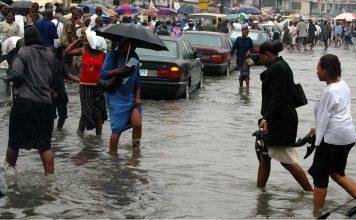Mrs Grace Mbah, the co-founder and Executive Director of Climate Action Africa, has revealed that coastal cities like Lagos facing the risk of flooding as a result of rising sea levels and ecological disruption.
According to her statement, she stated that Nigeria was facing a climate change challenge, which make it highly vulnerable to the devastating impacts of a global warming, including extreme weather events like floods and droughts, rising sea levels.
She said, “These changes threaten not only Nigeria’s environment but also its economic growth, social development, and overall well-being. Nigeria’s rainy seasons have changed. Coastal cities like Lagos face the risk of inundation/flooding due to rising sea levels. This saltwater intrusion contaminates freshwater sources and threatens coastal ecosystems. Erosion caused by rising sea levels destroys infrastructure and can displace populations. If global warming exceeds 2°C, Lagos State is predicted to see a 90cm rise in sea level by 2,100.
“Some other current climate change issues in Nigeria include frequent and intense heat waves, deforestation, overgrazing, and extreme weather events that contribute to land degradation. There is no doubt that Nigeria faces a real climate change challenge. The government and other stakeholders must put in place mitigation and adaptation projects, such as developing renewable energy sources and reducing emissions, as well as adaptation efforts, including building resilient infrastructure and fostering community resilience, to curb climate change challenges in Nigeria.
Mbah said, climate finance plays a critical role in empowering developing nations like Nigeria to combat climate change, “A solution to Nigeria’s rising climate change challenge is climate finance. Climate finance refers to local, national, and transnational financing that is drawn from public, private, and alternative sources of financing that seeks to support mitigation and adaptation actions that will address climate change.”
She stressed that it implements mitigation and adaptation strategies that safeguard the environment and bolster climate resilience.
Mbah noted that by effectively deploying climate finance, the country could invest in renewable energy sources like solar and wind power, which could lessen reliance on fossil fuels and reduce greenhouse gas emissions.
She added, “Funds can be directed towards strengthening infrastructure to withstand extreme weather events, developing climate-resistant crop varieties, and improving early warning systems. Support for the adoption of sustainable agricultural practices that enhance food security and reduce deforestation can also be achieved.
“Nigeria’s current climate finance scenario paints a concerning picture. Estimates suggest the country receives around $1.9bn annually, a far cry from the estimated $17.7bn required to meet its NDC targets by 2030.”
She said that this significant funding gap translated to a lack of resources for crucial climate action initiatives.
“The consequences of inaction are dire. Studies by the Department for International Development indicate that climate change could cost Nigeria between 6 per cent and 30 per cent of its GDP by 2050. This economic strain, coupled with environmental degradation and social upheaval, could significantly destabilise the nation,” Mbah elucidated.
Mbah also stressed that bridging the climate finance gap necessitated a multi-pronged approach involving various stakeholders, like the public and private sector, and international community.
“Climate change is an existential threat to Nigeria, but it also presents an opportunity for transformation. By mobilising adequate climate finance, Nigeria can build a low-carbon and climate-resilient future.
“This will require a collective effort from the government, private sector, and international community. With decisive action and innovative solutions, Nigeria can not only safeguard its environment but also secure a sustainable and prosperous future for its citizens,” she declared.
